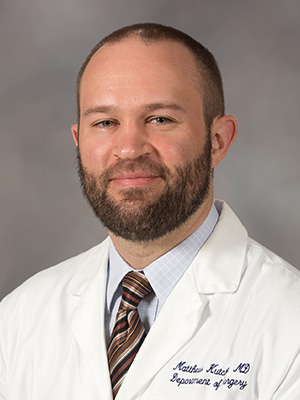What to know, and when to go for treatment of the curious organ
The appendix might be one of the least useful parts of the body, but it can cause serious problems if it gets infected.
Dr. Matthew Kutcher, assistant professor of surgery at the University of Mississippi Medical Center, said appendectomies are the most common surgical procedure in the United States. About one in 20 people will have theirs removed at some point in their life, usually during adolescence or early adulthood.

“Just about everyone knows someone who has had an appendectomy,” said Kutcher, a trauma and acute care surgeon.
The appendix is a finger-sized tube connected to the intestines. Scientists debate whether it serves as a reservoir for healthy gut bacteria or is just a digestive tract outcast without a purpose.
One thing that isn’t up for debate: The appendix can get infected. Appendicitis occurs when gut bacteria become trapped inside, multiply and cause inflammation and swelling.
“People with appendicitis will typically report a loss of appetite and pain near their belly button or in the lower right portion of the abdomen,” Kutcher said. “Fever and tenderness are also common symptoms.”
At first, some people with appendicitis may think they have food poisoning or some other gastrointestinal bug.
“Typically, those conditions go away without seeking medical attention,” he said. “But most people who have appendicitis say it feels different.”
If the pain does not improve or gets worse during the course of 1-3 days, especially if it’s in the lower right quadrant of the abdomen, it’s time to see a doctor, Kutcher said.
Physicians can use a combination of bloodwork and imaging to diagnose appendicitis. The standard of care is surgery to remove the organ, usually with minimally invasive techniques.
“We can treat about 95 percent of appendicitis cases with laparoscopic surgery and the patient can be discharged after 24 hours,” he said.
If the appendix is perforated, then the bacteria can leak into the abdominal cavity. This can cause an abscess or dangerous systemic infection. In this case, physicians may need to insert a tube to drain the area before surgery.
The patient will probably also need a larger surgical incision to remove the appendix and clean the area, which extends the hospital stay, Kutcher said.
But for those who have uncomplicated appendicitis, there may be alternative treatments. In a study published online Oct. 5 in the New England Journal of Medicine, researchers found that antibiotics to kill the bacteria may be a good option for some patients.
“If it matters to a patient that they avoid surgery, it is reasonable to try to treat them with antibiotics first,” if their condition allows, said Kutcher, one of the study co-authors.
For example, people with heart or lung conditions that increase the risks associated with anesthesia may benefit from using a course of antibiotics instead of surgery, Kutcher said. It may also be a good option for otherwise-healthy young people, who can try the drugs first then return for surgery if they do not work.
“You could be treated for appendicitis without having to stay overnight in the hospital” by receiving a course of antibiotics in an emergency department, then taking oral antibiotics at home and continuing to work or go to school, Kutcher said.
This could be especially helpful in a state like Mississippi, where patients may have a longer travel time to hospitals. It’s also relevant in the time of COVID-19, as people try to limit travel and potential exposure.
In the trial, about three in 10 people who tried antibiotics later required surgery to remove their appendix, showing that this approach isn’t one size fits all. In addition, appendicitis with an appendicolith, or hard mineral deposit, should probably still be treated with surgery, Kutcher said.
The most important aspect of this study, he said, is that patients were able to express what matters most to them when making treatment decisions and make those choices in consultation with their physicians.
“We have two very good treatments for appendicitis,” Kutcher said. “Physicians should present these options, their benefits and risks, and participate in shared decision-making process with their patients.”
The above article appears in CONSULT, UMMC’s monthly e-newsletter sharing news about cutting-edge clinical and health science education advances and innovative biomedical research at the Medical Center and giving you tips and suggestions on how you and the people you love can live a healthier life. Click here and enter your email address to receive CONSULT free of charge. You may cancel at any time.



